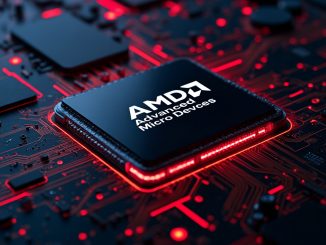
Advanced Micro Devices (AMD) has captured significant attention in the investment world, especially after Cathie Wood’s Ark Invest purchased 82,456 shares on December 31. This acquisition, valued at approximately $10.32 million, is based on AMD’s January 3 closing price of $125.37 per share. This move by Ark Invest underscores the confidence some investors still have in AMD, despite the mixed signals from its recent financial performances.
In October 2024, AMD reported third-quarter earnings that met analysts’ expectations, driven by an 18% revenue increase to $6.82 billion, exceeding the forecasted $6.71 billion. However, the optimism was tempered when the company’s fourth-quarter guidance fell short of Wall Street’s hopes, projecting sales of $7.5 billion, just shy of the $7.54 billion analysts had anticipated. This discrepancy raised concerns about AMD’s ability to capitalize on the burgeoning AI market, where it has been playing catch-up to Nvidia (NVDA), the current leader in AI GPU technology.
The narrative around AMD continues to be heavily influenced by its ventures into artificial intelligence (AI). Despite the excitement, AMD’s market share in AI remains considerably smaller than Nvidia’s, which has carved out a dominant position in the AI GPU sector. This gap highlights the challenges AMD faces in not only scaling its production but also in innovating to meet the specific demands of AI applications where performance per watt and efficiency are critical.
CEO Lisa Su has acknowledged the supply constraints, noting that chip supplies would be tight in 2025. During Q3’s earnings call, she highlighted that the demand for AI chips from major tech companies like Microsoft (MSFT) and Meta (META) is surging at a pace far exceeding the supply from AMD and its larger rival, Nvidia. This imbalance is creating significant strain on production capabilities. This is partly due to supply constraints at Taiwan Semiconductor Manufacturing (TSM), the world’s largest contract chip manufacturer. This admission points to broader industry issues where demand for high-performance chips outstrips supply, particularly in tech sectors driven by AI, gaming, and data centers. Su’s comments during the earnings call reflect a strategic optimism, however, with plans for significant growth and an emphasis on enhancing supply chain capabilities to address these shortages.
Investors and analysts are thus watching closely how AMD will navigate these challenges. The company’s ability to ramp up production, innovate, and capture more of the AI market will be crucial. While Ark Invest’s recent investment shows faith in AMD’s potential, the broader market seems cautious, awaiting clearer signs of AMD’s trajectory in AI and beyond. The balance between supply constraints and market demand, along with AMD’s strategic initiatives, will likely shape its stock performance — which has fallen 26.64% over the last three months and around 10% over the past year — as well as influence investor sentiment in the year ahead.
WallStreetPit does not provide investment advice. All rights reserved.
- Bulenox: Get 45% to 91% OFF ... Use Discount Code: UNO
- Risk Our Money Not Yours | Get 50% to 90% OFF ... Use Discount Code: MMBVBKSM
Disclaimer: This page contains affiliate links. If you choose to make a purchase after clicking a link, we may receive a commission at no additional cost to you. Thank you for your support!



Leave a Reply